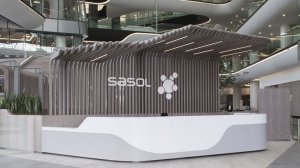Sasol mitigates material matters issues in 2017


MANAGING MATTERS Sasol reviews and monitors material matters through stakeholder inclusiveness always keeping a sustainability context in mind
To mitigate material matters that could substantially affect its ability to create value in the short, medium or long term, as a result of not being able to execute its strategy and the impact thereof on its ability to stay competitive, petrochemicals giant Sasol has outlined a five-step process to manage these material matters.
For this year, Sasol identified macroecono- mic environment, delivering value-based growth, human capital management, environ- mental sustainability and commitment to communities as five material matters that it needs to pay attention to.
The company mentioned in its integrated report in June that the five-step process to manage these material matters would firstly involve identifying issues by reviewing board submissions, its operating environment, risk management findings and stakeholder issues.
Secondly, Sasol prioritises material matters by assessing materiality, impact of delivering on strategy and risk metrics in the context of the company’s strategy.
Thirdly, Sasol responds through assessing the impact on risk tolerance and risk appetite, actioning activities required to manage material matters, evaluating scenario modelling outcomes and trade-offs between capitals.
The fourth step entails reporting plausible outcomes to the board and stakeholders.
Lastly, Sasol reviews and monitors these material matters through stakeholder inclusiveness and always keeping sustainability in mind.
Material Matters
Macroeconomic issues involve Sasol’s profit- ability, which is impacted on by changes in the oil price and the rand:dollar exchange rate as most of its products have a rand cost base and a dollar-based final selling price.
“Subdued world growth this year limited the rise in commodity and energy prices and our revenue, margins and earnings,” states Sasol.
The rand was volatile and it strengthened in the first half of the financial year before losing ground to the dollar in the second half, owing to political instability, which resulted in the downgrade of South Africa’s sovereign credit rating to subinvestment status.
“This has implications for our future cost of funding, our rand-based product prices and our share price.”
Sasol mitigated this issue by entering into crude oil put options for about 82% of its liquid fuel sales to protect the balance sheet against adverse movements in commodity and product prices.
Delivering value-based growth entails driving continuous improvement, harnessing technology and talent, as well as developing a diverse portfolio and embracing more digital solutions.
This year, Sasol drove value-based growth by implementing a new capital allocation framework, with a disciplined and transparent process that includes improving safety, production, technological, environmental and financial performance.
These improvements are done by engaging with stakeholders through a planned yearly programme, enhancing partnerships, and formally designing a digital roadmap.
Further, Sasol aims to address human capital management issues by promoting safety, diversity and cultural transformation, attracting and developing high-performing people, while engaging with employees and respecting human rights.
This is achieved by focusing on employee wellness, which entails disease management, psychosocial wellness, and surveying employees’ levels of indebtedness and risk management.
“We adopted a risk-based approach to minimise labour volatility challenges. This required a review of our broader employee relations landscape and the adoption of a more integrated approach across all affected stakeholder groups aimed at achieving greater employee engagement and ensuring business continuity,” Sasol outlines.
The company invested R1-billion in bursaries, learnerships and scarce critical skills development.
For ensuring environmental sustainability, Sasol secures its licence to operate by driving sustainable air quality, waste and land risk management, responding to climate change and energy security challenges, as well as promoting water stewardship and ensuring responsible product stewardship.
Sasol’s strategies to achieve sustainability include roadmaps and footprints pertaining to preventing pollution, minimising emissions, adhering to landfill prohibitions and resolving water infrastructure challenges.
Further, the material matter of commitment to communities entails optimising the impact of Sasol’s social investment programmes by increasing local content and collaborating more broadly to address social and economic development challenges within the community.
“At Sasol, we recognise that we have an important role to play in the socioeconomic development of the communities in which we operate. Most of our fenceline communities expect that we contribute to creating employment opportunities, skills development as well as facilitating access to our supply chain,” reports Sasol.
The company brings good corporate citizenship to life through its multipronged, multi- year, integrated social investment programmes.
Sasol has spent R676-million globally in social investment, 88% of which was in South Africa, and invested R333-million on improving science, technology, engineering and mathematics education in Southern Africa, which has impacted on six-million learners.
Additionally, more than R30-million has been spent on increasing access to healthcare in fenceline communities in South Africa and Mozambique, which has impacted on 274 893 people and created 99 jobs.
The company also invested R128-million in projects working in partnership with local govern- ment and other stakeholders to improve delivery of services to fenceline communities, and offered a loan book of R139-million to small, medium-sized and microenterprises.
Article Enquiry
Email Article
Save Article
Feedback
To advertise email advertising@creamermedia.co.za or click here
Announcements
What's On
Subscribe to improve your user experience...
Option 1 (equivalent of R125 a month):
Receive a weekly copy of Creamer Media's Engineering News & Mining Weekly magazine
(print copy for those in South Africa and e-magazine for those outside of South Africa)
Receive daily email newsletters
Access to full search results
Access archive of magazine back copies
Access to Projects in Progress
Access to ONE Research Report of your choice in PDF format
Option 2 (equivalent of R375 a month):
All benefits from Option 1
PLUS
Access to Creamer Media's Research Channel Africa for ALL Research Reports, in PDF format, on various industrial and mining sectors
including Electricity; Water; Energy Transition; Hydrogen; Roads, Rail and Ports; Coal; Gold; Platinum; Battery Metals; etc.
Already a subscriber?
Forgotten your password?
Receive weekly copy of Creamer Media's Engineering News & Mining Weekly magazine (print copy for those in South Africa and e-magazine for those outside of South Africa)
➕
Recieve daily email newsletters
➕
Access to full search results
➕
Access archive of magazine back copies
➕
Access to Projects in Progress
➕
Access to ONE Research Report of your choice in PDF format
RESEARCH CHANNEL AFRICA
R4500 (equivalent of R375 a month)
SUBSCRIBEAll benefits from Option 1
➕
Access to Creamer Media's Research Channel Africa for ALL Research Reports on various industrial and mining sectors, in PDF format, including on:
Electricity
➕
Water
➕
Energy Transition
➕
Hydrogen
➕
Roads, Rail and Ports
➕
Coal
➕
Gold
➕
Platinum
➕
Battery Metals
➕
etc.
Receive all benefits from Option 1 or Option 2 delivered to numerous people at your company
➕
Multiple User names and Passwords for simultaneous log-ins
➕
Intranet integration access to all in your organisation



















